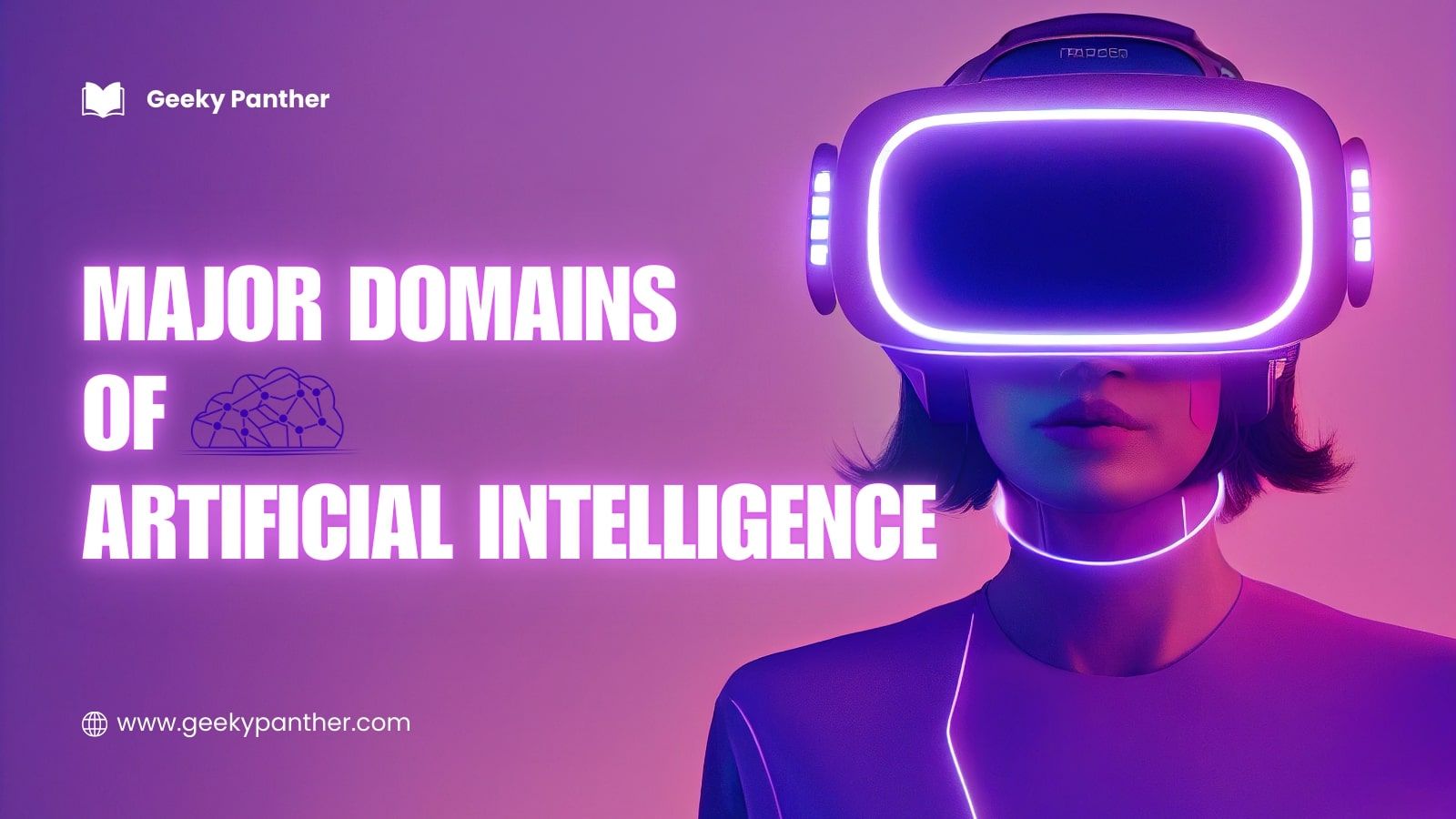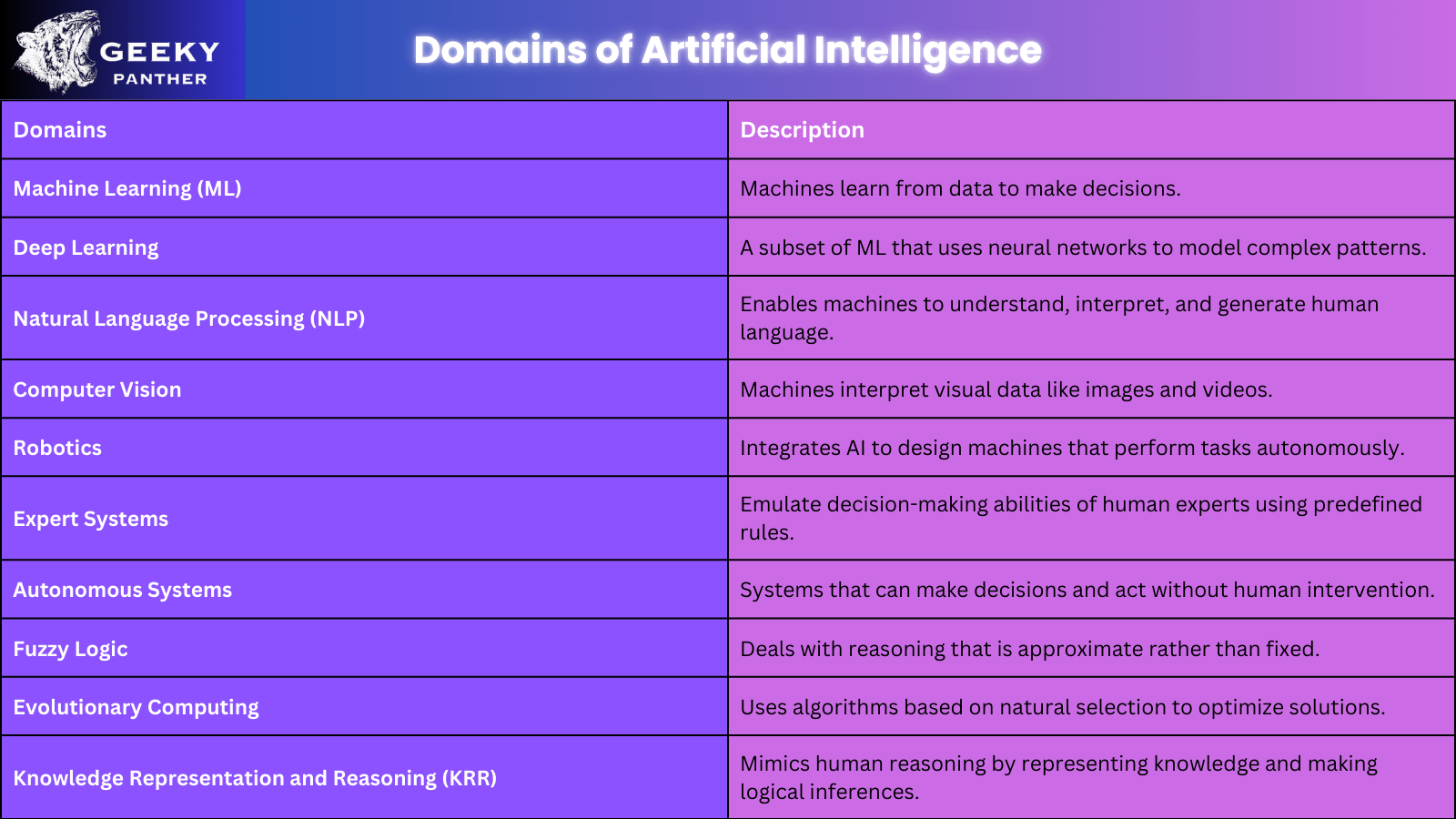The Domains of Artificial Intelligence are transforming the way we live, work, and interact with technology. From machine learning and natural language processing to robotics and computer vision, these domains are changing industries by enabling automation, decision-making, and predictive analytics.
Artificial Intelligence (AI) is now a part of our everyday lives, affecting how we talk, work, and even relax. But what exactly is AI, and what are its different domains? In this article, we will explain the domains of artificial intelligence and explore how each area contributes to advancements in technology.

Domains of Artificial Intelligence: Why Do We Need Artificial Intelligence?
Before getting into the domains, it’s essential to address the fundamental question: Why do we need AI? Imagine going through millions of data points manually to find a pattern or making real-time decisions in complex environments. Sounds exhausting, right? AI steps in to handle these tasks with precision and speed, enhancing efficiency and opening doors to innovations previously deemed impossible.
Concept Behind Domains of AI
AI is not a single thing; it includes various domains of artificial intelligence, each representing different levels of intelligence:
Narrow or Weak AI
This form of AI is designed for specific tasks. Think of your smartphone’s voice assistant or recommendation algorithms on streaming services. They’re proficient in their designated functions but don’t possess general intelligence.
General AI (Artificial General Intelligence)
Often depicted in movies, this AI possesses the ability to understand, learn, and apply knowledge across a broad range of tasks, much like a human. While we’re not there yet, researchers are continually striving toward this goal.
Artificial Superintelligence
This is the hypothetical AI that surpasses human intelligence in all aspects. It remains a topic of philosophical debates and ethical considerations.
The Major Domains of Artificial Intelligence
To truly understand AI, we must first explain the domains of artificial intelligence. The Domains of Artificial Intelligence include vision, speech, and decision-making. Now, let’s take a look into the primary domains of AI:
1. Machine Learning (ML)
At the heart of AI lies Machine Learning, where systems learn from data to make decisions. It’s like teaching a child to recognize animals by showing numerous pictures until they get it right. ML powers applications like email spam filters and personalized recommendations.
2. Deep Learning
A subset of ML, Deep Learning uses neural networks with multiple layers to model complex patterns. It’s the magic behind voice recognition systems and autonomous vehicles, enabling machines to perceive and interpret data akin to human vision and hearing.
3. Natural Language Processing (NLP)
Ever wondered how chatbots understand and respond to your queries? That’s NLP in action. It enables machines to comprehend, interpret, and generate human language, facilitating seamless interactions between humans and computers.
4. Computer Vision
This domain allows machines to interpret visual data from the world, such as images and videos. Applications range from facial recognition systems to medical image analysis, transforming how we interact with visual information.
5. Robotics
Domains of Artificial Intelligence span from machine learning to robotics. Robotics integrates AI to design machines that can perform tasks autonomously. From robotic vacuum cleaners to industrial robots assembling cars, this domain is revolutionizing efficiency and precision in various sectors.
6. Expert Systems
Expert systems emulate the decision-making ability of a human expert. They are used in fields like medical diagnosis and financial forecasting, providing insights based on vast amounts of data and predefined rules.
7. Autonomous Systems
These systems can make decisions and act without human intervention. Self-driving cars and drones are prime examples, operating based on real-time data and adaptive algorithms.
8. Fuzzy Logic
Unlike traditional binary logic, fuzzy logic deals with reasoning that is approximate rather than fixed. It’s used in applications like temperature control systems, where inputs can be imprecise, and decisions aren’t just black or white.
9. Evolutionary Computing
Inspired by biological evolution, this domain uses algorithms based on natural selection to solve complex problems. It’s akin to survival of the fittest but in the realm of code, optimizing solutions over generations.
10. Knowledge Representation and Reasoning (KRR)
KRR enables machines to mimic human reasoning by representing knowledge about the world and making logical inferences. It’s fundamental in developing systems that require understanding and reasoning, such as virtual personal assistants.
11. Reinforcement Learning
Reinforcement Learning (RL) is a type of machine learning where an agent learns to make decisions by interacting with an environment to maximize a cumulative reward. It is inspired by behavioral psychology, where actions that lead to positive outcomes are reinforced. Advancements in the Domains of Artificial Intelligence are shaping the future.
Key Components of Reinforcement Learning:
- Agent: The learner or decision-maker (e.g., a robot, or AI in a game).
- Environment: The world in which the agent operates.
- State (S): The current situation of the agent in the environment.
- Action (A): Choices are available to the agent in a given state.
- Reward (R): A numerical value given as feedback for an action (positive for good actions, negative for bad).
- Policy (π): The strategy that the agent follows to decide the next action.
- Value Function (V): Measures the long-term reward of being in a particular state.
- Q-Function (Q): Measures the expected reward of taking an action in a particular state.

What are the Main Domain of Artificial Intelligence? (Top Three Domains of Artificial Intelligence)
The top three domains of Artificial Intelligence (AI) are Machine Learning (ML), Natural Language Processing (NLP), and Computer Vision. Machine Learning enables AI systems to learn patterns from data and make predictions without explicit programming, with key approaches such as supervised learning, unsupervised learning, and reinforcement learning. In addition to these three domains, Data Science also plays an important role in AI.
Natural Language Processing focuses on understanding, interpreting, and generating human language, powering applications like chatbots, sentiment analysis, and machine translation. Computer Vision allows AI to analyze and interpret visual data, enabling technologies such as facial recognition, object detection, and medical image analysis. These three domains form the foundation of AI, driving advancements across industries. Apart from these 3, Data Science is also an important domain of AI.
The key domains of AI, such as Machine Learning, Deep Learning, Natural Language Processing, Computer Vision, and Data Science, are leading the way in this technological revolution. As AI advances, it is crucial to leverage its benefits while considering ethical implications. AI domains are broadly categorized into Formal tasks, Mundane tasks, and Expert tasks.
Interconnection Between AI Domains
These domains don’t operate in isolation. For instance, an autonomous drone utilizes computer vision to navigate, NLP to understand voice commands, and machine learning to adapt to new environments. The synergy between these domains leads to more robust and versatile AI applications.
Advantages and Benefits of Artificial Intelligence
AI brings a lot of benefits:
- Efficiency and Automation: Difficult tasks can be automated, freeing up human resources for more creative endeavors.
- Data Analysis: AI can process and analyze vast datasets swiftly, uncovering patterns and insights that would be challenging for humans to detect.
- Personalization: From tailored shopping experiences to customized learning plans, AI enhances personalization in various services.
- Improved Decision Making: AI systems assist in making informed decisions by providing data-driven insights, and reducing human error.
Artificial Intelligence: Career Opportunities
The AI boom has unlocked numerous career paths:
- Data Scientists: Experts who analyze and interpret complex data to aid decision-making.
- AI Engineers: Professionals who design and develop AI models and systems.
- Robotics Specialists: Individuals who create and maintain robotic systems for various applications.
- NLP Engineers: Specialists focusing on enabling machines to understand and interact using human language.
Skills You Need for a Career in AI
Aspiring to venture into the AI field? Equip yourself with:
- Programming Proficiency: Languages like Python and R are essential tools in AI development.
- Mathematical Aptitude: A strong foundation in linear algebra, calculus, and statistics is crucial.
- Analytical Thinking: The ability to dissect complex problems and devise logical solutions.
- Continuous Learning: AI is an ever-evolving field; staying updated with the latest advancements is key.
Challenges Faced in AI Development
Despite its advancements, AI faces several challenges:
- Ethical Concerns: Issues like bias in AI algorithms and the potential for job displacement raise ethical questions.
- Data Privacy: Ensuring that AI systems respect user privacy while leveraging data is a significant hurdle.
- High Costs: Developing sophisticated AI models requires substantial computational resources, making it expensive.
- Lack of Transparency: Many AI models, especially deep learning-based ones, operate like “black boxes,” making it difficult to understand how they make decisions.
- Security Risks: AI-powered systems can be vulnerable to cyberattacks, raising concerns about their safe deployment.
Future of Artificial Intelligence
Mastering various Domains of Artificial Intelligence requires innovation and data. The future of AI holds exciting possibilities. As AI continues to evolve, we can expect:
- More Human-Like Interactions: AI-driven chatbots and virtual assistants will become even more natural in their conversations.
- Advancements in Healthcare: AI will assist in diagnosing diseases, personalizing treatment plans, and even performing complex surgeries with robotic precision.
- Smarter Cities: AI will optimize traffic flow, manage energy consumption efficiently, and enhance public safety.
- Breakthroughs in Creativity: AI is already composing music, writing poetry, and generating artwork—imagine where it will go next!
But, of course, with great power comes great responsibility. The ethical implications of AI development will need careful consideration to ensure its benefits outweigh potential risks.
Conclusion: Domains of Artificial Intelligence
Artificial Intelligence is no longer a concept confined to science fiction—it’s a reality shaping our present and future. Businesses are leveraging various domains of Artificial Intelligence for automation and insights. Understanding its domains helps us appreciate the immense potential AI has to change and upgrade industries, simplify our daily tasks, and even push the boundaries of human knowledge.
So, whether you’re an aspiring AI professional or just someone curious about how your voice assistant understands you so well, one thing is certain—AI is here to stay, and it’s only getting smarter!
What are your thoughts on AI? Do you see it as an opportunity, or are you a little wary of its growing presence?

